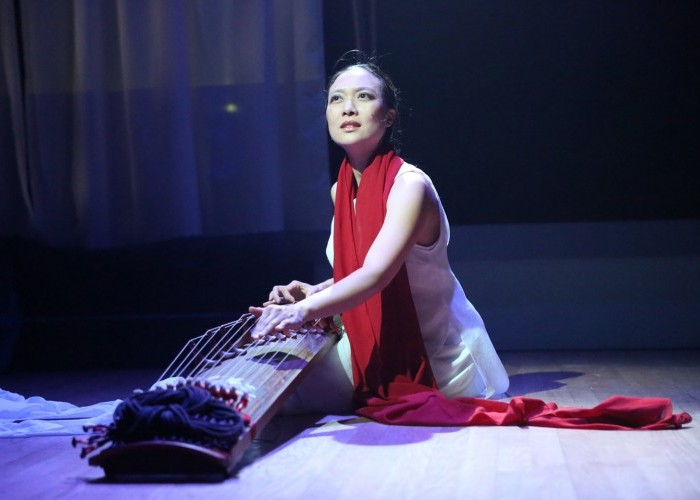Jan 13, 2026 2:09 PM
More Trump-Kennedy Center Cancellations
The fallout from the renaming of the John F. Kennedy Center for the Performing Arts to include President Donald…

“It’s always been there,” multi-instrumentalist and vocalist Jen Shyu said about a wave of vitriol aimed at Asian Americans during the coronavirus pandemic. “These events, they’re just an excuse for people.”
(Photo: Steven Schreiber/pirecordings.com)For Hatamiya, the challenge is for people to recognize his embrace of traditional and modern jazz as a facet of his own identity.
For Sugimoto and Shyu, their intention has been to examine and embrace their identities as Asian women in their music.
“What I’ve been exploring my whole life as an artist is trying to come up in a music world—and more specifically a jazz world—that has objectified me and ‘exoticized’ me as an Asian female,” Shyu said.
Both Shyu and Sugimoto have felt pressure from various people—men who suggested it would bolster their careers if they played up their sexuality. For Asian women, that expectation can cause profound confusion about who they should or want to be.
“When I was little, the thing I wanted to do most was to be Miss Saigon on Broadway,” Shyu said, laughing. “It’s kind of disturbing: My greatest ambition was to be a prostitute on stage.”
The thread tying these artists together is tethered to a needle that pierces the heart of every Asian who was born in or immigrated to the States: the seemingly unsolvable paradox of belonging here and identifying with American culture, yet being seen as “the other” by neighbors.
Jang recently was out buying groceries, preparing to hunker down and protect against the coronavirus, when a woman yelled at him, accusing the pianist and composer of trying to cut in line. He won’t ever know if her anger was motivated by conscious or unconscious racial bias, but it’s a worry that he shares with the other artists interviewed here—as well as those who nervously endure the current wave of bigotry pointed at Asian Americans.
Four decades after the inception of Asian Improv aRts, Asian Americans continue to find different ways of reconciling their origin stories with their passion for jazz and improvised music, knocking down persistent racial stereotypes in the process.
But Jang realizes everyone needs to find their own path.
“For Francis and myself, that’s our history; for the younger generation, it’s not going to be the same,” he said. “What we share is our personal expression in our own unique way. We march to the beat of a different gong.” DB

Belá Fleck during an interview with Fredrika Whitfield on CNN.
Jan 13, 2026 2:09 PM
The fallout from the renaming of the John F. Kennedy Center for the Performing Arts to include President Donald…

Peplowski first came to prominence in legacy swing bands, including the final iteration of the Benny Goodman Orchestra, before beginning a solo career in the late 1980s.
Feb 3, 2026 12:10 AM
Ken Peplowski, a clarinetist and tenor saxophonist who straddled the worlds of traditional and modern jazz, died Feb. 2…

The success of Oregon’s first album, 1971’s Music Of Another Present Era, allowed Towner to establish a solo career.
Jan 19, 2026 5:02 PM
Ralph Towner, a guitarist and composer who blended multiple genres, including jazz — and throughout them all remained…

Rico’s Anti-Microbial Instrument Swab
Jan 19, 2026 2:48 PM
With this year’s NAMM Show right around the corner, we can look forward to plenty of new and innovative instruments…

Richie Beirach was particularly renowned for his approach to chromatic harmony, which he used to improvise reharmonizations of originals and standards.
Jan 27, 2026 11:19 AM
Richie Beirach, a pianist and composer who channeled a knowledge of modern classical music into his jazz practice,…